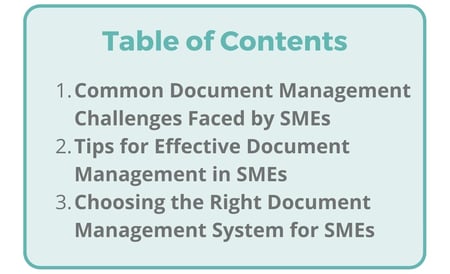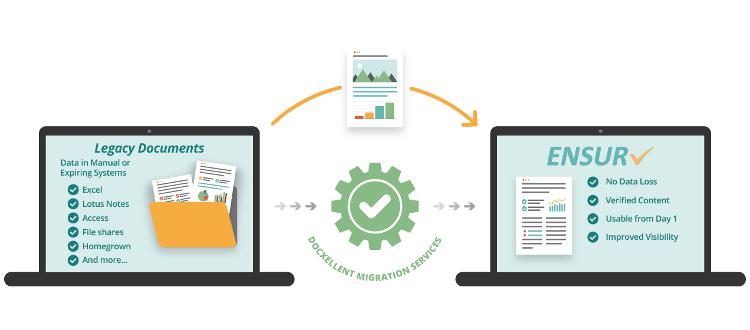.jpg?width=810&height=450&name=Document%20Management%20for%20Small%20and%20%20Medium-Sized%20Enterprises%20Tips%20for%20Success%20(1).jpg)
Document management is a critical aspect of business operations that involves the storage, organization, and management of physical and digital documents. The process of document management includes capturing, storing, retrieving, sharing, and disposing of documents in a secure, efficient, and compliant manner. This process is especially important for small and medium-sized enterprises (SMEs) if they are looking to maintain operational efficiency, minimize costs, and ensure regulatory compliance. In this article, we’ll break down the most helpful tips for SMEs to harbor successful document management processes.

Common Document Management Challenges Faced by SMEs
SMEs face unique challenges in managing documents. Let’s take a look at a few:
- Limited resources: SMEs often have limited resources and budget constraints, making it difficult for them to invest in a robust document management system. They may lack the funds to purchase hardware, software, or infrastructure required for document management. This can result in an ad-hoc approach to document management, with files stored on local hard drives, shared drives, or email. However, this approach can lead to data duplication, version control issues, and security risks.
- Inefficient manual processes: Many SMEs rely on manual processes for document management, such as printing and filing hard copies, manually inputting data into spreadsheets, and sending emails with attachments. Manual processes are time-consuming, error-prone, and can lead to information silos within the organization. Employees spend valuable time searching for documents or updating spreadsheets, rather than focusing on core business activities.
- Lack of standardization and organization: Without a standardized approach to document management, SMEs can struggle to organize, store, and retrieve documents efficiently. Files may be stored in different formats, in different locations, with inconsistent naming conventions or metadata, making it difficult to search for and retrieve specific documents. This can lead to duplication of work, missed deadlines, and lost opportunities.
- Security and compliance risks: SMEs often handle sensitive or confidential information, such as financial records, employee data, or customer information. Without proper document management processes in place, this information can be at risk of theft, loss, or unauthorized access. SMEs need to comply with regulations related to data protection, such as the General Data Protection Regulation (GDPR) or the Health Insurance Portability and Accountability Act (HIPAA). Failure to comply can result in financial penalties, legal liabilities, and damage to the organization's reputation.
Tips for Effective Document Management in SMEs
To overcome these challenges, SMEs can implement effective document management strategies, such as:
- Invest in a document management system (DMS): A DMS can help SMEs automate their document management processes, reduce errors, and increase efficiency.
- Establish a document management policy and standard operating procedures (SOPs): SOPs can help SMEs create a policy that outlines how documents will be managed, including who has access to them, how they will be stored, and how they will be secured.
- Implement document version control and access permissions: SMEs should use version control to ensure that the latest version of a document is always available, and that confidential or sensitive information is only accessed by authorized personnel.
- Use metadata and indexing for easy retrieval of documents: Metadata can be used to tag documents with relevant information, such as author, date, and keywords, while indexing can be used to create a searchable database of documents.
- Train employees on proper document management practices: Employees should be trained on how to use the DMS, adhere to the document management policy, and follow proper document management practices.
- Regularly review and update document management processes: SMEs should regularly review and update their document management processes to ensure they are still effective and efficient.
Choosing the Right Document Management System for SMEs
Investing in a document management system (DMS), like ENSUR, can help SMEs overcome the common challenges of document management. A DMS can streamline document creation, storage, retrieval, and sharing, all while providing security and compliance features. However, not all DMS solutions are created equal. SMEs need to evaluate various factors before choosing a DMS that fits their specific needs and budget. Here are some key considerations when selecting a DMS for your SME:
Key features to consider in a DMS
A DMS should have essential features that support your document management needs. These may include:
- Document storage and retrieval: A DMS should allow you to store documents in a centralized location, with the ability to search, retrieve, and share them with authorized users.
- Version control: The system you choose should enable you to keep track of different versions of a document, with the ability to revert to previous versions if needed.
- Access permissions: You should be able to set access permissions for different users or groups, ensuring that only authorized users can view or edit specific documents.
- Workflow automation: A DMS should allow you to automate document workflows, such as approval processes, notifications, or task assignments, saving time and reducing errors.
- Integration with other systems: A robust DMS should integrate with other business systems, such as email, CRM, or ERP, allowing for seamless document management across the organization.
Scalability and customization options
SMEs should choose a DMS that can adapt to their changing needs over time. A DMS should be scalable and able to accommodate a growing volume of documents and users. Additionally, SMEs may require customization options to tailor the DMS to their specific business processes or industry regulations.
Cost considerations
SMEs need to evaluate the costs associated with implementing a DMS, including:
- Software licensing fees: Some DMS solutions charge per user or per document stored, while others offer a flat rate.
- Implementation costs: Implementing a DMS may require hardware or software upgrades, as well as training and support for employees.
- Maintenance and support fees: Some DMS solutions require ongoing maintenance and support fees, while others offer these services for free.
- Scalability: SMEs should consider the ability of a DMS to scale as their business grows, without incurring significant additional costs.
Effective document management is essential for the success of small and medium-sized enterprises (SMEs). SMEs face unique challenges when it comes to managing their documents, including limited resources, inefficient manual processes, lack of standardization and organization, and security and compliance risks. However, by prioritizing document management and implementing best practices and the right DMS solution, SMEs can streamline their document management processes, increase productivity, and reduce risk, ultimately leading to their long-term success.
To learn about how DocXellent’s ENSUR Document Management System can help streamline the operations of your small or medium size business, contact us today or request an ENSUR demo.

Gary Carignan is DocXellent’s President and has been a part of the team since 2013 when he joined as the Vice President of Sales. With nearly 30 years of sales experience, Gary has a proven track record of delivering results and building long-term customer relationships. Prior to joining DocXellent, he worked for one of the original leaders in the electronic services industry and he has a unique background in software engineering. Learn more about Gary here.






























